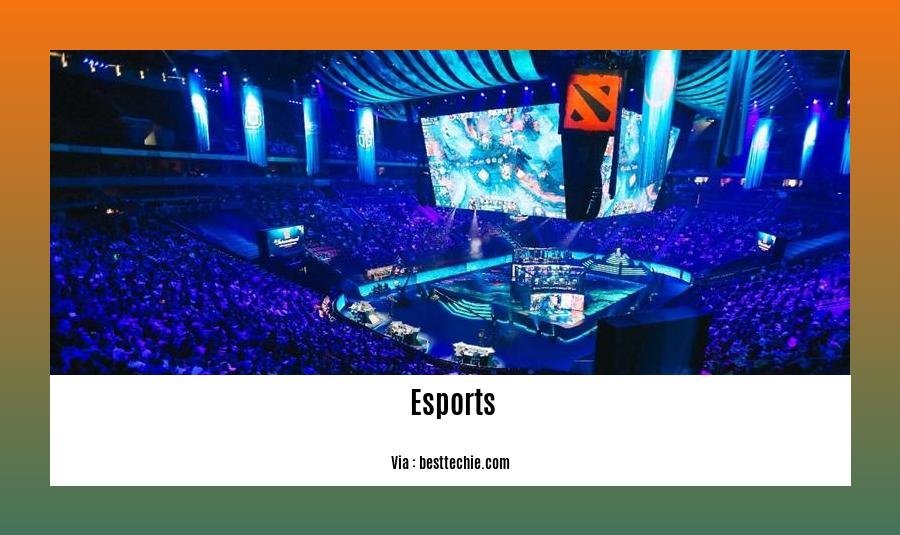– The Rise of Esports: Unraveling the Complexity of the Gaming Phenomenon –
Key Takeaways:
- Esports is competitive video gaming at a professional level.
- Players are often contracted to organizations, like traditional sports teams.
- Competitions can be individual or team-based, with specialized player roles.
- Esports has a vast fan base, with large events and tournaments.
- The industry generates substantial revenue through sponsorships and merchandise.
Esports: A Thriving World of Competitive Gaming

With the rise of the digital age, esports has emerged as a captivating phenomenon, captivating gamers and spectators alike. Esports competitions showcase the extraordinary skills and strategies of professional gamers, pitting them against each other in thrilling battles for glory and prize pools.
What is Esports?
Esports is a form of competitive gaming where individuals or teams engage in organized matches utilizing video game platforms. Players are typically professionals, contracted to organizations akin to traditional sports teams. Like in traditional sports, esports players specialize in specific roles within a game, maximizing their team’s potential for victory.
The Dynamics of Esports
Esports tournaments can be individual or team-based, hosting a vast array of game titles spanning multiple genres. The competitive spirit is fierce, with players honing their reflexes, strategic thinking, and teamwork to outmaneuver and outplay their opponents. The top esports players are renowned for their exceptional skills and ability to adapt to the ever-evolving game environments.
The Impact of Esports
The meteoric rise of esports has revolutionized the gaming industry. It has become a major revenue generator, attracting sponsorships from various industries and propelling the development of streaming platforms. Esports events draw massive crowds and media attention, captivating audiences with the excitement and entertainment of high-stakes gaming.
Key Trends in Esports
The esports industry is constantly evolving, with new trends emerging all the time. Some key trends include:
- Growth in mobile esports
- Expansion into new genres, such as battle royale and simulations
- Increased investments from traditional sports organizations
- The emergence of esports academies and training programs
Conclusion
Esports is a vibrant and rapidly growing phenomenon that continues to redefine the world of entertainment and gaming. With its captivating tournaments, skilled players, and passionate fans, esports is poised to continue its ascent as a global force, captivating the imaginations of gamers and spectators alike.
The history of video games has seen many technological breakthroughs and game-changing moments. One of the earliest milestones in gaming history was the development of early arcade games, which laid the foundation for the industry as we know it today. As technology continued to evolve, so too did video games, leading to advancements in home console development that brought gaming into the homes of millions around the world.
Impact on Traditional Sports and Entertainment
Esport commands the attention of a young generation, notably absent from traditional sports. Concepts of fandom are evolving as esports exploits social and streaming media, widening accessibility through computers and consoles.
Declining Traditional Sports Viewership
Traditional sports face a decline in spectatorship as esports gains traction. Esports is more accessible, fostering a fan base unbound by geographical or physical barriers.
Gambling on Esports
The sprawling popularity of esports has ignited a surge in gambling activities, contributing significantly to its economic influence.
Key Takeaways:
- Esports attracts a demographic disinterested in traditional sports.
- Social media and streaming platforms enhance esports accessibility.
- Esports offers greater accessibility than traditional sports, capturing a broader audience.
- Esports events present unique opportunities for spectator engagement.
- Esports betting has gained significant popularity.
Citations:
- The Popularity of eSports and Its Impact on Traditional Sports
- The Societal Impact of Electronic Sport: A Scoping Review
Player Profiles and Motivations: Exploring the Drive Behind Esports Stars

Understanding the Esports Athlete
Professional esports players are a unique breed of athletes, navigating the complexities of digital battlegrounds with precision, strategy, and an unwavering competitive spirit. But what drives these individuals to dedicate their lives to the pursuit of virtual victory?
The Power of Extrinsic and Intrinsic Motivation
Extrinsic motivation fuels the desire for external rewards, such as trophies, prize money, and recognition. Intrinsic motivation, on the other hand, stems from a deep-seated passion for the game itself. Studies have shown that both forms of motivation play a crucial role in driving the physical activity levels and energy expenditure of esports players.
Beyond Sedentary Stereotypes
Contrary to popular belief, the majority of esports players are far from sedentary. In fact, research indicates that 92.7% engage in moderate to high levels of physical activity. This is because esports competitions demand quick reflexes, hand-eye coordination, and strategic thinking, all of which require a strong physical foundation.
Health Considerations: Beyond Esports Performance
While esports players may not be focused on physical training solely to enhance their gaming performance, they recognize the importance of maintaining good health. Regular exercise is often incorporated into their routines with the aim of promoting overall well-being and preventing the potential health risks associated with prolonged sitting.
Key Takeaways:
- Both extrinsic and intrinsic motivation are essential for esports players’ success.
- Despite stereotypes, most esports players engage in regular physical activity.
- Esports players prioritize health considerations, recognizing the importance of maintaining well-being.
Relevant URL Sources:
- Professional Esports Players: Motivation and Physical Activity Levels
- The motivations of esports players
Evolution of Game Genres and Formats
Within the ever-expanding world of esports, the evolution of game genres and formats has been a driving force, shaping the industry’s trajectory. From the early days of simple arcade games to the complex, multiplayer experiences of today, the gaming landscape has undergone a remarkable transformation.
The introduction of new game genres, such as first-person shooters, real-time strategy, and battle royales, has expanded the appeal of esports, attracting a wider range of players and viewers. These genres offer distinct gameplay mechanics, requiring different skill sets and strategies, catering to diverse preferences.
Simultaneously, the evolution of game formats has played an equally significant role. The rise of online multiplayer modes has enabled players to compete against each other from around the globe. The development of dedicated competitive modes, designed specifically for esports, has further enhanced the competitive experience, providing a level playing field and standardized rulesets.
Key Takeaways:
- The evolution of game genres and formats has significantly influenced the growth and popularity of esports.
- New genres, such as first-person shooters and battle royales, have broadened the appeal of esports.
- The development of dedicated competitive modes has enhanced the competitive experience and fostered a more professional environment.
Relevant URL Sources:
FAQ
Q1: What is the appeal of esports?
A1: Esports offers a unique blend of competition, skill, and entertainment, attracting a growing audience of fans who appreciate the strategic gameplay and intense battles that unfold in virtual arenas.
Q2: How does esports differ from traditional sports?
A2: Esports is unique in that it features competition in video games, while traditional sports involve physical activities. Esports players compete in organized tournaments for prizes and recognition, similar to traditional athletes.
Q3: What are the physical fitness considerations for esports players?
A3: Despite the common misconception of esports as a sedentary activity, many professional players engage in regular physical training to maintain their health, enhance their focus, and promote overall well-being.
Q4: How has technology influenced the growth of esports?
A4: Advancements in technology, such as faster internet speeds and improved gaming hardware, have significantly contributed to the rise of esports by enabling smoother online gameplay, larger tournaments, and broader accessibility for both players and spectators.
Q5: What is the future of esports?
A5: The future of esports appears promising, with continuous growth expected in viewership, revenue, and professionalization. Esports is poised to establish itself as a mainstream entertainment option, comparable to traditional sports.
- Sept 31 Myth: Unveiling Calendar Secrets - March 18, 2025
- How Long & Till December 18, 2025: Accurate Countdown Guide - March 18, 2025
- Discover Japanese Artists: A Complete History - March 18, 2025
















